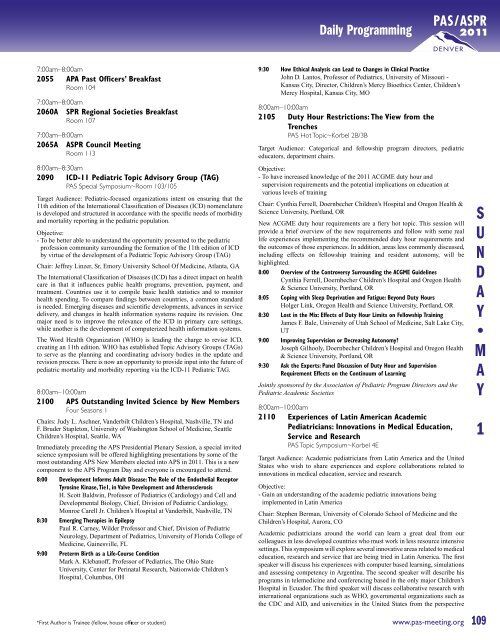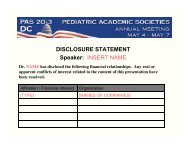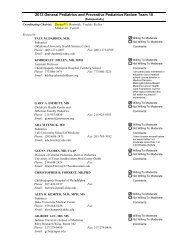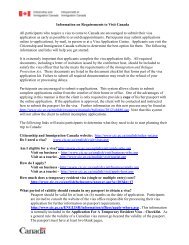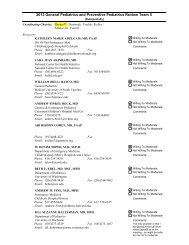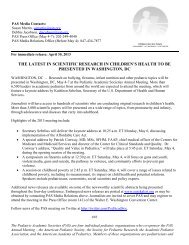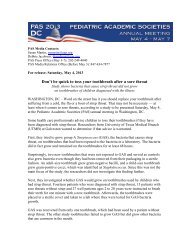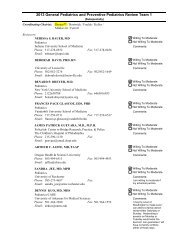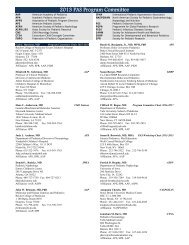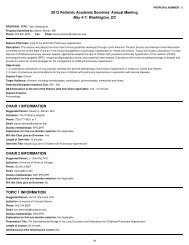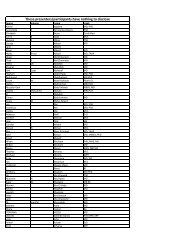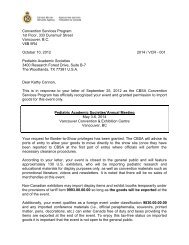F R I D A Y • A P R I L - Pediatric Academic Societies
F R I D A Y • A P R I L - Pediatric Academic Societies
F R I D A Y • A P R I L - Pediatric Academic Societies
You also want an ePaper? Increase the reach of your titles
YUMPU automatically turns print PDFs into web optimized ePapers that Google loves.
7:00am–8:00am<br />
2055 APA Past Officers’ Breakfast<br />
Room 104<br />
7:00am–8:00am<br />
2060A SPR Regional <strong>Societies</strong> Breakfast<br />
Room 107<br />
7:00am–8:00am<br />
2065A ASPR Council Meeting<br />
Room 113<br />
8:00am–8:30am<br />
2090 ICD-11 <strong>Pediatric</strong> Topic Advisory Group (TAG)<br />
PAS Special Symposium~Room 103/105<br />
Target Audience: <strong>Pediatric</strong>-focused organizations intent on ensuring that the<br />
11th edition of the International Classification of Diseases (ICD) nomenclature<br />
is developed and structured in accordance with the specific needs of morbidity<br />
and mortality reporting in the pediatric population.<br />
Objective:<br />
- To be better able to understand the opportunity presented to the pediatric<br />
profession community surrounding the formation of the 11th edition of ICD<br />
by virtue of the development of a <strong>Pediatric</strong> Topic Advisory Group (TAG)<br />
Chair: Jeffrey Linzer, Sr, Emory University School Of Medicine, Atlanta, GA<br />
The International Classification of Diseases (ICD) has a direct impact on health<br />
care in that it influences public health programs, prevention, payment, and<br />
treatment. Countries use it to compile basic health statistics and to monitor<br />
health spending. To compare findings between countries, a common standard<br />
is needed. Emerging diseases and scientific developments, advances in service<br />
delivery, and changes in health information systems require its revision. One<br />
major need is to improve the relevance of the ICD in primary care settings,<br />
while another is the development of computerized health information systems.<br />
The Word Health Organization (WHO) is leading the charge to revise ICD,<br />
creating an 11th edition. WHO has established Topic Advisory Groups (TAGs)<br />
to serve as the planning and coordinating advisory bodies in the update and<br />
revision process. There is now an opportunity to provide input into the future of<br />
pediatric mortality and morbidity reporting via the ICD-11 <strong>Pediatric</strong> TAG.<br />
8:00am–10:00am<br />
2100 APS Outstanding Invited Science by New Members<br />
Four Seasons 1<br />
Chairs: Judy L. Aschner, Vanderbilt Children’s Hospital, Nashville, TN and<br />
F. Bruder Stapleton, University of Washington School of Medicine, Seattle<br />
Children’s Hospital, Seattle, WA<br />
Immediately preceding the APS Presidential Plenary Session, a special invited<br />
science symposium will be offered highlighting presentations by some of the<br />
most outstanding APS New Members elected into APS in 2011. This is a new<br />
component to the APS Program Day and everyone is encouraged to attend.<br />
8:00 Development Informs Adult Disease: The Role of the Endothelial Receptor<br />
Tyrosine Kinase, Tie1, in Valve Development and Atherosclerosis<br />
H. Scott Baldwin, Professor of <strong>Pediatric</strong>s (Cardiology) and Cell and<br />
Developmental Biology, Chief, Division of <strong>Pediatric</strong> Cardiology,<br />
Monroe Carell Jr. Children’s Hospital at Vanderbilt, Nashville, TN<br />
8:30 Emerging Therapies in Epilepsy<br />
Paul R. Carney, Wilder Professor and Chief, Division of <strong>Pediatric</strong><br />
Neurology, Department of <strong>Pediatric</strong>s, University of Florida College of<br />
Medicine, Gainesville, FL<br />
9:00 Preterm Birth as a Life-Course Condition<br />
Mark A. Klebanoff, Professor of <strong>Pediatric</strong>s, The Ohio State<br />
University, Center for Perinatal Research, Nationwide Children’s<br />
Hospital, Columbus, OH<br />
*First Author is Trainee (fellow, house officer or student)<br />
Daily Programming<br />
9:30 How Ethical Analysis can Lead to Changes in Clinical Practice<br />
John D. Lantos, Professor of <strong>Pediatric</strong>s, University of Missouri -<br />
Kansas City, Director, Children’s Mercy Bioethics Center, Children’s<br />
Mercy Hospital, Kansas City, MO<br />
8:00am–10:00am<br />
2105 Duty Hour Restrictions: The View from the<br />
Trenches<br />
PAS Hot Topic~Korbel 2B/3B<br />
Target Audience: Categorical and fellowship program directors, pediatric<br />
educators, department chairs.<br />
Objective:<br />
- To have increased knowledge of the 2011 ACGME duty hour and<br />
supervision requirements and the potential implications on education at<br />
various levels of training<br />
Chair: Cynthia Ferrell, Doernbecher Children’s Hospital and Oregon Health &<br />
Science University, Portland, OR<br />
New ACGME duty hour requirements are a fiery hot topic. This session will<br />
provide a brief overview of the new requirements and follow with some real<br />
life experiences implementing the recommended duty hour requirements and<br />
the outcomes of those experiences. In addition, areas less commonly discussed,<br />
including effects on fellowship training and resident autonomy, will be<br />
highlighted.<br />
8:00 Overview of the Controversy Surrounding the ACGME Guidelines<br />
Cynthia Ferrell, Doernbecher Children’s Hospital and Oregon Health<br />
& Science University, Portland, OR<br />
8:05 Coping with Sleep Deprivation and Fatigue: Beyond Duty Hours<br />
Holger Link, Oregon Health and Science University, Portland, OR<br />
8:30 Lost in the Mix: Effects of Duty Hour Limits on Fellowship Training<br />
James F. Bale, University of Utah School of Medicine, Salt Lake City,<br />
UT<br />
9:00 Improving Supervision or Decreasing Autonomy?<br />
Joseph Gilhooly, Doernbecher Children’s Hospital and Oregon Health<br />
& Science University, Portland, OR<br />
9:30 Ask the Experts: Panel Discussion of Duty Hour and Supervision<br />
Requirement Effects on the Continuum of Learning<br />
Jointly sponsored by the Association of <strong>Pediatric</strong> Program Directors and the<br />
<strong>Pediatric</strong> <strong>Academic</strong> <strong>Societies</strong><br />
8:00am–10:00am<br />
2110 Experiences of Latin American <strong>Academic</strong><br />
<strong>Pediatric</strong>ians: Innovations in Medical Education,<br />
Service and Research<br />
PAS Topic Symposium~Korbel 4E<br />
Target Audience: <strong>Academic</strong> pediatricians from Latin America and the United<br />
States who wish to share experiences and explore collaborations related to<br />
innovations in medical education, service and research.<br />
Objective:<br />
- Gain an understanding of the academic pediatric innovations being<br />
implemented in Latin America<br />
Chair: Stephen Berman, University of Colorado School of Medicine and the<br />
Children’s Hospital, Aurora, CO<br />
<strong>Academic</strong> pediatricians around the world can learn a great deal from our<br />
colleagues in less developed countries who must work in less resource intensive<br />
settings. This symposium will explore several innovative areas related to medical<br />
education, research and service that are being tried in Latin America. The first<br />
speaker will discuss his experiences with computer based learning, simulations<br />
and assessing competency in Argentina. The second speaker will describe his<br />
programs in telemedicine and conferencing based in the only major Children’s<br />
Hospital in Ecuador. The third speaker will discuss collaborative research with<br />
international organizations such as WHO, governmental organizations such as<br />
the CDC and AID, and universities in the United States from the perspective<br />
www.pas-meeting.org<br />
S<br />
U<br />
N<br />
D<br />
A<br />
Y<br />
<strong>•</strong><br />
M<br />
A<br />
Y<br />
0


